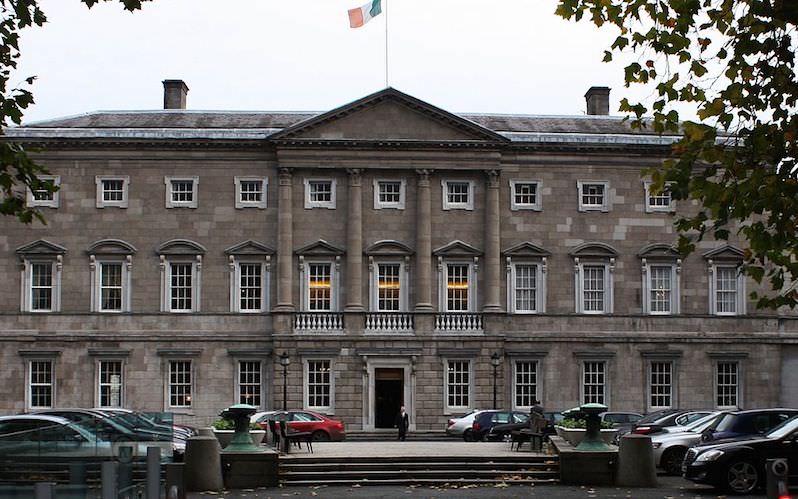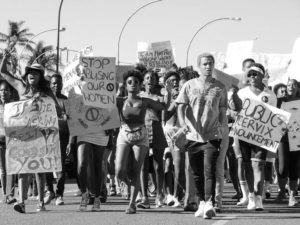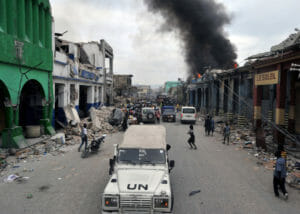An Activist Hails Law Criminalizing Purchase of Sex in Ireland
The new legislation also sparks a sense of mourning for women who didn’t live to benefit from it.
By Rachel Moran

Leinster House, the Irish Parliamentary building in Dublin, where lawmakers passed the Sexual Offences Act on Feb. 14. (Tebibyte / CC-BY-SA)
On March 27, the Sexual Offences Act finally passed into Irish law. The activists involved in its passage, including myself, had pressed for this law for anything between six and 10 years. It is difficult to describe how it feels to live in a country where the purchase of sexual consent has finally been outlawed. We activists are assumed to be jumping for joy, clinking wine glasses and smiling. There has been a bit of that, for sure, and that has lent some light relief, but it is far from the whole story.
This victory arrived in stages. On Feb. 14, the legislation finally passed through the Seanad (Senate) after a 4 ½-hour performance that would have been better suited to a theater stage, and had it played out there, Sen. Michael McDowell would certainly have had the starring role. We were subjected to descriptions of the issue bizarrely removed from reality, while McDowell glared at activists in the public gallery and thundered about the “poor lonely housewives” who would have their “lives destroyed” for “renting gigolos.”
We were asked to consider “the plight of 18-year-old boys, up in Dublin for the all-Ireland hurling match,” who also were looking into bleak and miserable futures because of this disastrous legislation that would expect them to keep their penises to themselves. Then McDowell expected us to feel sorry for the “poor divils, likely with drink,” apparently inebriated to the point of irresponsibility for their own exploitative actions.
Nowhere in these myriad permutations did the profile of actual johns feature—the wealthy white men who make up the enormous majority of those who choose to exploit the desperation of women and children. Was it a coincidence that the diatribe was delivered by a wealthy white man?
Then we were treated to McDowell’s view of prostituted women, who were, he bemoaned, “free to roam the streets and public houses” under this legislation. From my point of view, the display was bloody hilarious. There were points where I choked back laughter, and other points where I didn’t bother choking it back at all. Here was a man describing prostitution as predatory females dragging innocent young boys up alleyways and preying on them in pubs while the poor boys were too naive to know better and too inebriated with drink to do anything about it even if they did.
It was a cartoon fantasy come to life, ludicrous almost beyond the point of offense. Almost—because every now and again, while McDowell was treating us to this display of idiocy, my mind would serve me up a memory. The first time Annie (some names have been changed to protect identities) got out of a john’s car, lost, used and broken. The first time I saw Louise shove a needle in her arm. The last time I saw Maebh, except I didn’t really see her, because her coffin was closed.
I must have retained a sardonic edge to my sense of humor, because nothing McDowell said infuriated me so much that I had to leave, unlike the young woman, also a sex-trade survivor, sitting beside me. After all his rantings, the law passed. It was nine o’clock in the evening. I went across to the local pub with my friends and colleagues and ordered a glass of wine at the bar. I had the most surreal moment, standing beside a man—a stranger—just minding his own business and drinking his pint, and I thought, “No matter what happens in my life, you have no right to buy me.” I couldn’t make it sink in. It didn’t feel real.
For International Women’s Day on March 8, we had planned a celebratory event in city hall. I was due to speak, alongside other sex-trade survivors and activists, all of us welcoming in the new law. The taxi that took me there drove past a college that used to hold art classes. I had enrolled Maebh there and would sometimes pick her up after class and take her for something to eat. We’d talk about what she had created that day and what she might want for her future.
She was still knee-deep in prostitution and addiction, and I was trying—really trying—to help her make some sense of her life, to give her something to strive for. She had always loved art and had been employed as an artist in her very first job. She lost that job when the studio folded, and she got into prostitution later that same year. She was 17 at the time.
Driving by that college, I was assaulted by the thought: “You’re just as dead as you were before we got this legislation.” I immediately berated myself for my pessimism. Here I was, on my way to deliver a public speech about the new dawn of women’s rights in our country, on International Women’s Day, and all I could think about was the women who were dead because they had no rights, or because their rights were seen not to matter, or, more to the point, because the rights of men to unfettered sexual access to women’s bodies had been tacitly approved for so many centuries in my country that we’ll never be able to count our women and girls who’ve died in the service of it.
We hear, over and over, about the shockingly high homicide rate in prostitution, and we should be shocked at a homicide rate that’s been recorded at 40 times the national average, but the truth is that homicide deaths in prostitution are only the tip of the iceberg. Suicide has also been found to be a significant consequence of prostitution, and every death in my circle was a result of drug overdose, cirrhosis of the liver or cervical cancer. There is also, of course, HIV. These ways that prostituted women die, taken together, outstrip the homicide rate by many, many times.I thought that day about all the appalling ways women suffer and die because of prostitution, and I just couldn’t find a way to be happy. What was there to cheer for, I wondered? That finally our human worth had been recognized to the extent that the avalanche of misery and death is no longer implicitly condoned by the state? It seemed obscene to me that we should clap and cheer for the delivery of something so overdue and so basic. Far from celebrating, I felt we ought to be calling for a tribunal of inquiry into the centuries of human rights violations against women on my island.
I thought, too, about the stages of this process, this six-year-long, knock-down, drag-out fight I’ve been involved in; and in particular, I thought about the way I felt in 2012, when I was compiling witness testimony from other Irish women to submit in a bundle to the Irish government’s investigation into prostitution. I knew then that, sooner or later, the government would come to a decision—either to criminalize men who bought sexual access to women or to let them go on their merry way, and I knew something else, too: If they were going on their merry way, I was going on mine, except for me there would have been nothing merry about it. I knew I’d have to leave Ireland if it did not take this opportunity to criminalize the men who so abused us.
It’s difficult to articulate what that prospect meant to me. I love every square inch of my country. I love the rugged mountains and the cliffs and the Atlantic coastline of the west. I love the hidden glens and hills and lakes and valleys of the midlands. I love the woodland, the grass, the dew, the stars, the skies. I live on the east coast, in north Dublin, minutes from the sea, and our skies light up every color a sky can be: edgings of green, amber, peach and lavender on clouds against the purest, clearest blue. They make me wish I were a photographer. I love the heart and soul of Dublin city, where I grew up; the glimpses I see of it still—the cobblestones, the last of the old buildings, relics from my 1970s, inner-city childhood. To leave Ireland would have been to abandon a part of my essential self, but how could I stay in a country that had abandoned me? That was my great unarticulated fear at the beginning of this process: that I would have to leave my country, and I knew if this decision came back the wrong way that I would leave, but I also knew I would look back with the profoundest sadness and bitterest disgust.
But that day did not come. Instead, March 8 came, and instead of heading for the airport, I was heading for city hall, to celebrate the very reason I would not have to leave. So why did it hang so heavy on my heart?
I feel that we women—all women—have been mentally abused by the institution of prostitution. Its first harm is brainwashing, the peripheral harm that affects us all. It has indoctrinated us to accept prostitution as a part of life. Even if we have never experienced it personally and never will, we have come to accept it as routine in the lives of other women. We have come to accept it as a feature of female experience and as a regular fixture of our world; something in the atmosphere of our female relationship with reality itself. There might be no “would” or “should” in an individual life, but, for all women, there always exists the ominous “could.”
We have become so accustomed to our sexual degradation as a class that we have even bought in to the lying descriptors that seek to conceal it, and who is surprised that we’d use a normalizing term like “sex work” for what’s been sold to us as normal? But it is a tragedy that the commercialization of our sexual degradation is “normal” in our view, and it is infuriating that we do not take the time to distinguish between what is “normal” and what is “usual”—and if there is a greater tragedy here, it’s that we’ve come to confuse one with the other.
We need to unlock our minds and understand that this Irish victory, which has been hailed as wonderful, magnificent and marvelous, is in fact the simple restoration of bodily integrity: the most basic of human rights. Maybe we avoid that because when we confront it, we are in turn confronted with the anguished realization of how abysmally we’ve been treated as women, and for how long.
This step that my country has taken is as welcome as it could be, and I am as glad as I can be, given the complex layers of grief I have to process alongside the relief. I feel as though I, and all of us who’ve campaigned for this law, have reached the summit of an enormous mountain. It’s not that I want to dampen the mood here. It’s not that I want to strip the joy from our achievement. It’s just that I want a moment’s silence for the bodies in the foothills. I want us to remember those who never got to make the climb.
Your support matters…
Independent journalism is under threat and overshadowed by heavily funded mainstream media.
You can help level the playing field. Become a member.
Your tax-deductible contribution keeps us digging beneath the headlines to give you thought-provoking, investigative reporting and analysis that unearths what's really happening- without compromise.
Give today to support our courageous, independent journalists.









You need to be a supporter to comment.
There are currently no responses to this article.
Be the first to respond.